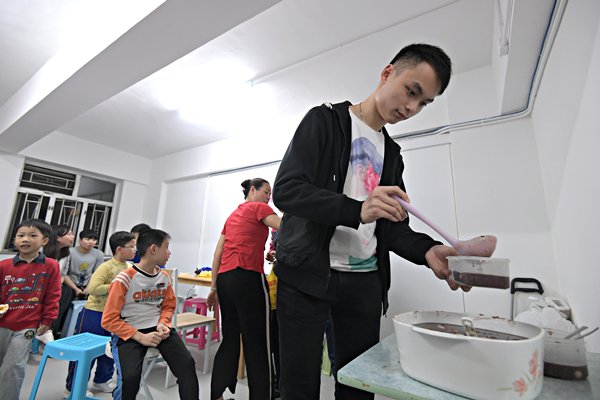
Residents of a Hong Kong Council of Social Service Community Housing Movement co-living space in To Kwa Wan are a close-knit community.
They share more than just common areas - they provide tutoring, meals and a wide range of activities to support each other.
One of these bonding activities was a Chinese dessert night organised by Sydney, who moved into the space in November last year.
He said activities such as dessert night bring neighbours together.
"The activities let us get to know each other better. We can share our feelings on living here and the problems that we face. That way, we can help each other out."
Mutual support
The co-living space at Ha Heung Road is the sixth one under the Hong Kong Council of Social Service Community Housing Movement. It is operated by the Salvation Army and its 53 units provide rooms for 76 families.
To live here, applicants must fulfil the council's tenancy eligibility.
Eligible tenants should be living in subdivided flats and been on the waiting list for public rental housing for at least three years, or have urgent housing needs, Salvation Army Community Project Service Supervisor Tom Ma said.
"They also need to have a full-time job or have applied for Comprehensive Social Security Assistance.
"In addition, they should agree with the concept of co-living and be able to live alongside other households.
"Tenants should provide services to their community. For example, youths can help tutor children and hold special interest classes, while seniors can cook meals for others."
Initially, Sydney was unsure about living with other families, but he realised that this is what made the co-living space unique.
"A mother and her son live in the next room. I was afraid I wouldn't get along with them, but they are very friendly.
"The mother prepares meals for me and at the same time, I have my own room where I can study hard without any distractions. I really appreciate this housing movement."
Sydney lives in a 100 sq ft room where there is a fan and an air conditioner, while a refrigerator and a stove are provided in a shared kitchen.
Enhanced living
Aside from being part of a unique community, tenants can also save money on rent.
Hong Kong Council of Social Service Business Director Anthony Wong said: "Statistics show that the average rental fee was around $4,000 before living here. After they moved here, the rent is around $3,000 which saves them about $1,000.
"The average living space has also increased from 60 sq ft to 106 sq ft."
The council's Community Housing Movement was launched in 2017 and aims to provide 500 units for 1,000 families by 2020.
The Community Chest has injected $50 million into the project while the Government advises on the project's building layout plans to ensure the residential units are suitable for families and adhere to fire safety regulations.
The 2019-20 Budget set aside $2 billion to support non-governmental organisations in constructing transitional housing. The council believes the measure can be used for renovating the units and to encourage more NGOs to join programme.
沒有留言:
張貼留言